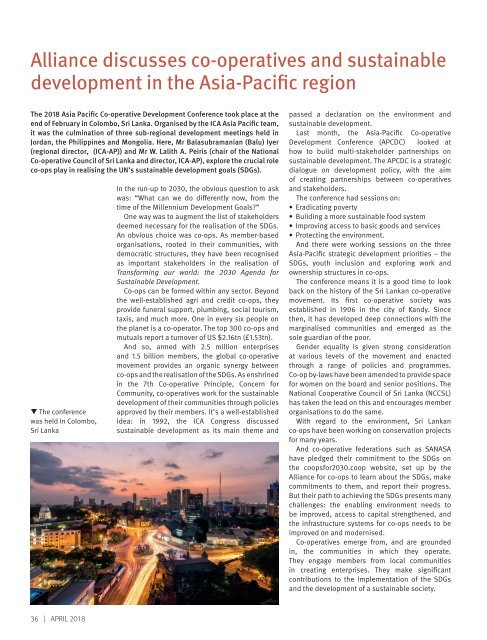APRIL 2018
The April 2018 edition of Co-op News: connecting, challenging and championing the global co-operative movement. This issue, in the lead up to Co-operative Education Conference, we look at how co-ops are putting principle 5 into action in the 21st century. We also celebrate 150 years of the East of England Co-op and present updates from the Co-op Retail and Abcul conferences.
The April 2018 edition of Co-op News: connecting, challenging and championing the global co-operative movement. This issue, in the lead up to Co-operative Education Conference, we look at how co-ops are putting principle 5 into action in the 21st century. We also celebrate 150 years of the East of England Co-op and present updates from the Co-op Retail and Abcul conferences.
Create successful ePaper yourself
Turn your PDF publications into a flip-book with our unique Google optimized e-Paper software.
Alliance discusses co-operatives and sustainable<br />
development in the Asia-Pacific region<br />
The <strong>2018</strong> Asia Pacific Co-operative Development Conference took place at the<br />
end of February in Colombo, Sri Lanka. Organised by the ICA Asia Pacific team,<br />
it was the culmination of three sub-regional development meetings held in<br />
Jordan, the Philippines and Mongolia. Here, Mr Balasubramanian (Balu) Iyer<br />
(regional director, (ICA-AP)) and Mr W. Lalith A. Peiris (chair of the National<br />
Co-operative Council of Sri Lanka and director, ICA-AP), explore the crucial role<br />
co-ops play in realising the UN’s sustainable development goals (SDGs).<br />
q The conference<br />
was held in Colombo,<br />
Sri Lanka<br />
In the run-up to 2030, the obvious question to ask<br />
was: “What can we do differently now, from the<br />
time of the Millennium Development Goals?”<br />
One way was to augment the list of stakeholders<br />
deemed necessary for the realisation of the SDGs.<br />
An obvious choice was co-ops. As member-based<br />
organisations, rooted in their communities, with<br />
democratic structures, they have been recognised<br />
as important stakeholders in the realisation of<br />
Transforming our world: the 2030 Agenda for<br />
Sustainable Development.<br />
Co-ops can be formed within any sector. Beyond<br />
the well-established agri and credit co-ops, they<br />
provide funeral support, plumbing, social tourism,<br />
taxis, and much more. One in every six people on<br />
the planet is a co-operator. The top 300 co-ops and<br />
mutuals report a turnover of US $2.16tn (£1.53tn).<br />
And so, armed with 2.5 million enterprises<br />
and 1.5 billion members, the global co-operative<br />
movement provides an organic synergy between<br />
co-ops and the realisation of the SDGs. As enshrined<br />
in the 7th Co-operative Principle, Concern for<br />
Community, co-operatives work for the sustainable<br />
development of their communities through policies<br />
approved by their members. It’s a well-established<br />
idea: in 1992, the ICA Congress discussed<br />
sustainable development as its main theme and<br />
passed a declaration on the environment and<br />
sustainable development.<br />
Last month, the Asia-Pacific Co-operative<br />
Development Conference (APCDC) looked at<br />
how to build multi-stakeholder partnerships on<br />
sustainable development. The APCDC is a strategic<br />
dialogue on development policy, with the aim<br />
of creating partnerships between co-operatives<br />
and stakeholders.<br />
The conference had sessions on:<br />
• Eradicating poverty<br />
• Building a more sustainable food system<br />
• Improving access to basic goods and services<br />
• Protecting the environment.<br />
And there were working sessions on the three<br />
Asia-Pacific strategic development priorities – the<br />
SDGs, youth inclusion and exploring work and<br />
ownership structures in co-ops.<br />
The conference means it is a good time to look<br />
back on the history of the Sri Lankan co-operative<br />
movement. Its first co-operative society was<br />
established in 1906 in the city of Kandy. Since<br />
then, it has developed deep connections with the<br />
marginalised communities and emerged as the<br />
sole guardian of the poor.<br />
Gender equality is given strong consideration<br />
at various levels of the movement and enacted<br />
through a range of policies and programmes.<br />
Co-op by-laws have been amended to provide space<br />
for women on the board and senior positions. The<br />
National Cooperative Council of Sri Lanka (NCCSL)<br />
has taken the lead on this and encourages member<br />
organisations to do the same.<br />
With regard to the environment, Sri Lankan<br />
co-ops have been working on conservation projects<br />
for many years.<br />
And co-operative federations such as SANASA<br />
have pledged their commitment to the SDGs on<br />
the coopsfor2030.coop website, set up by the<br />
Alliance for co-ops to learn about the SDGs, make<br />
commitments to them, and report their progress.<br />
But their path to achieving the SDGs presents many<br />
challenges: the enabling environment needs to<br />
be improved, access to capital strengthened, and<br />
the infrastructure systems for co-ops needs to be<br />
improved on and modernised.<br />
Co-operatives emerge from, and are grounded<br />
in, the communities in which they operate.<br />
They engage members from local communities<br />
in creating enterprises. They make significant<br />
contributions to the implementation of the SDGs<br />
and the development of a sustainable society.<br />
36 | <strong>APRIL</strong> <strong>2018</strong>


















